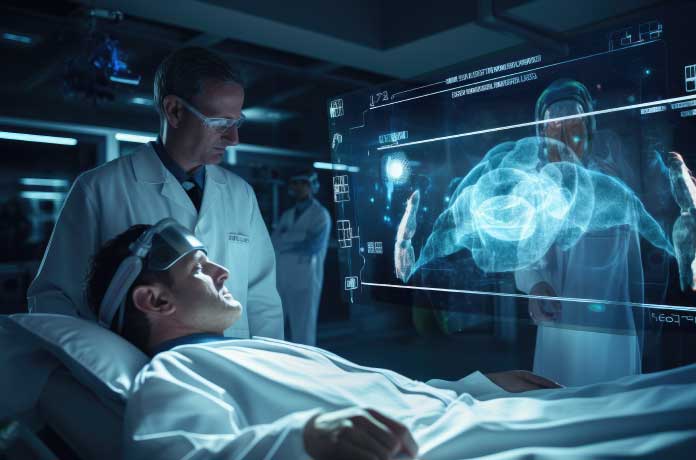People use AI as a fundamental part of everyday life through virtual personal assistants such as Siri and Alexa and predictive analytics programs that improve user satisfaction. The healthcare sector benefits extensively from AI because it creates transformative changes in patient treatment along with medical diagnoses and public health administration practices.
The Role of AI in Healthcare
AI creates multiple transformative healthcare impacts, leading to better medical results, reduced expenses, and better control of population health. Healthcare processes become smoother because AI is essential in disease prevention, diagnosis, and treatment of medical conditions.
Advancements in Preventive Care
The application of AI technology in radiology diagnosis has enabled faster and more exact cancer screening functions. The Mayo Clinic developed automated kidney image analysis for PKD total kidney volume assessment that decreased the assessment period from 45 minutes to only seconds. Through AI technology, radiologists receive help with tumor identification and perform measurements of fat and muscle while speeding up diagnostic processes.
Risk Assessment and Early Detection
Risk assessment implementation becomes more effective through the adoption of AI. AI systems at the Mayo Clinic evaluated patient heart health by detecting left ventricular dysfunction risks despite absent symptoms. AI technologies identify coronary artery calcium levels, predicting chronic heart disease risks for impending heart attacks and strokes multiple years ahead.
AI’s Contribution to Public Health
AI technology performs key functions in managing public health activities above treating single patients. Patients can maintain their chronic diseases better by receiving screening services, necessary treatments, and automatic medicine reminders through this approach. AI-driven analysis of social media trends coupled with online search behavior creates the possibility for early detection of disease outbreaks, which allows public health officials to receive warning alerts.
Enhancing Patient Care Through AI
AI functions as a tool that enhances medical professional activities without the ability to stand in their place. The results from the research show that AI diagnostic systems perform better than conventional pathology methods in detecting malignant mesothelioma and colorectal cancer. The deployment of AI-powered chatbots demonstrates their ability to give patients responsive and emotionally caring answers to their inquiries.
AI and Healthcare Professionals: A Collaborative Approach
The processing power of AI helps medical practitioners evaluate extensive research documents and conduct automated office responsibilities to deliver precise diagnostics. The interpretation of AI-generated results and clinical understanding needs continuous human intervention to succeed correctly.
Challenges and Ethical Considerations
Implementing AI technology in healthcare faces various hurdles, even though it delivers multiple benefits to the medical sector. Three main challenges regarding the adoption of AI in healthcare include model bias issues and misinformation spread by chatbots, while stringent regulations remain essential. Through their work, Mayo Clinic’s Health AI Partnership strives to establish appropriate ethical standards and fair utilization of AI within healthcare settings.
The Road Ahead
The future growth of AI technology promises momentous changes to healthcare. The upcoming era will witness AI systems performing remote health monitoring while detecting diseases early, conducting clinical trial matching, and conducting predictive risk assessments. The strategic deployment of AI under proper supervision creates an opportunity to transform patient care, which results in more efficient healthcare that provides precise medical services to all populations.




